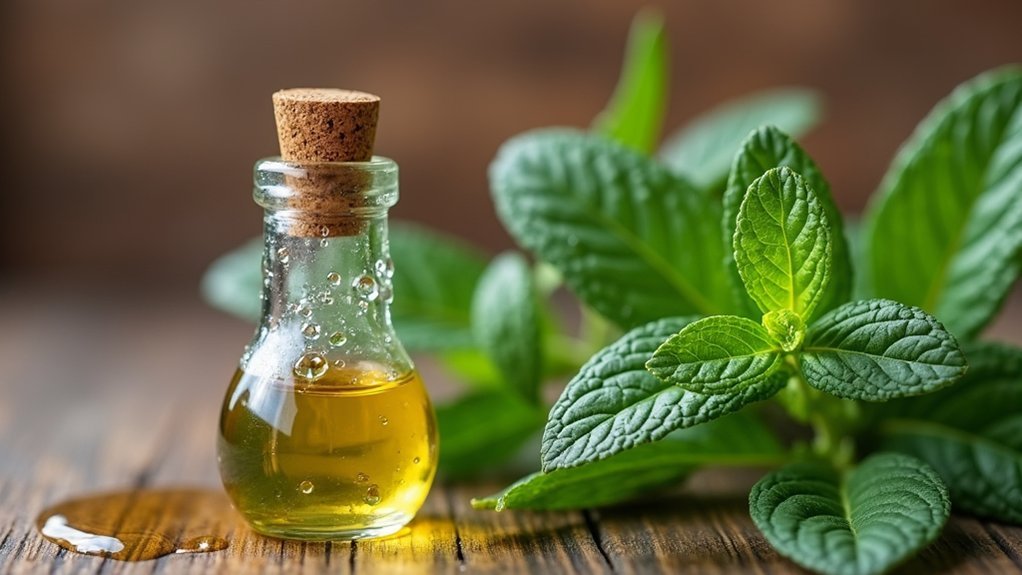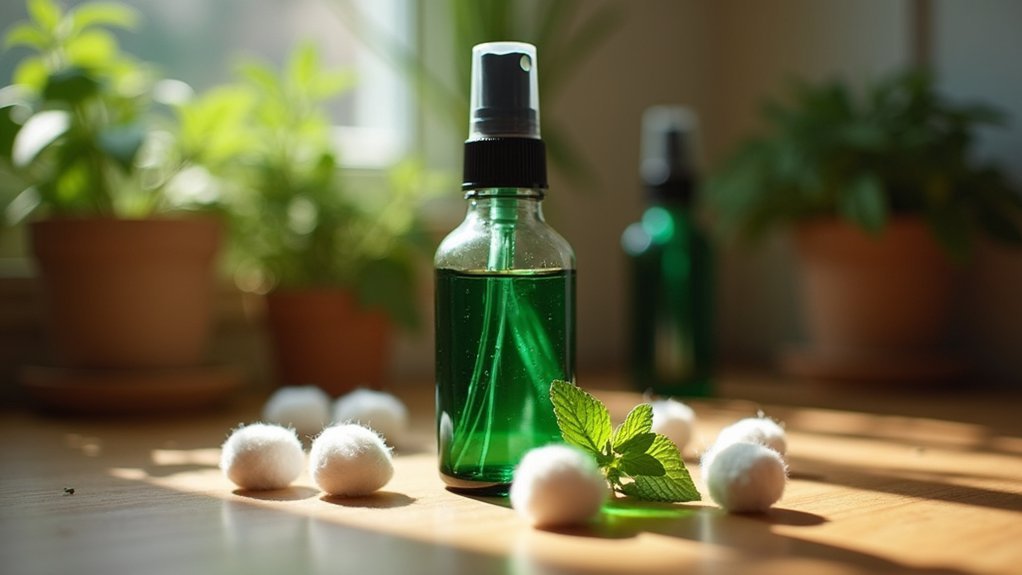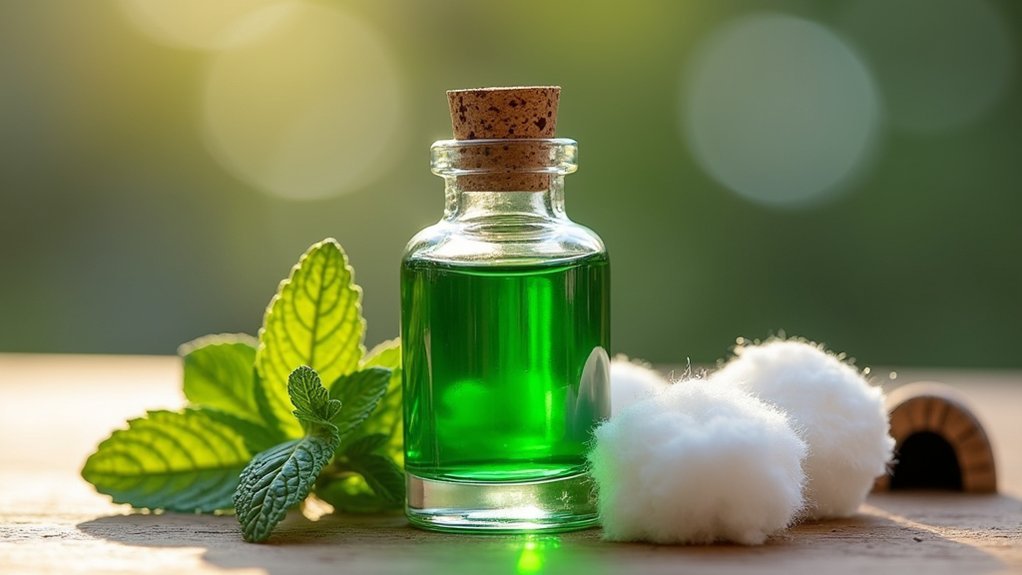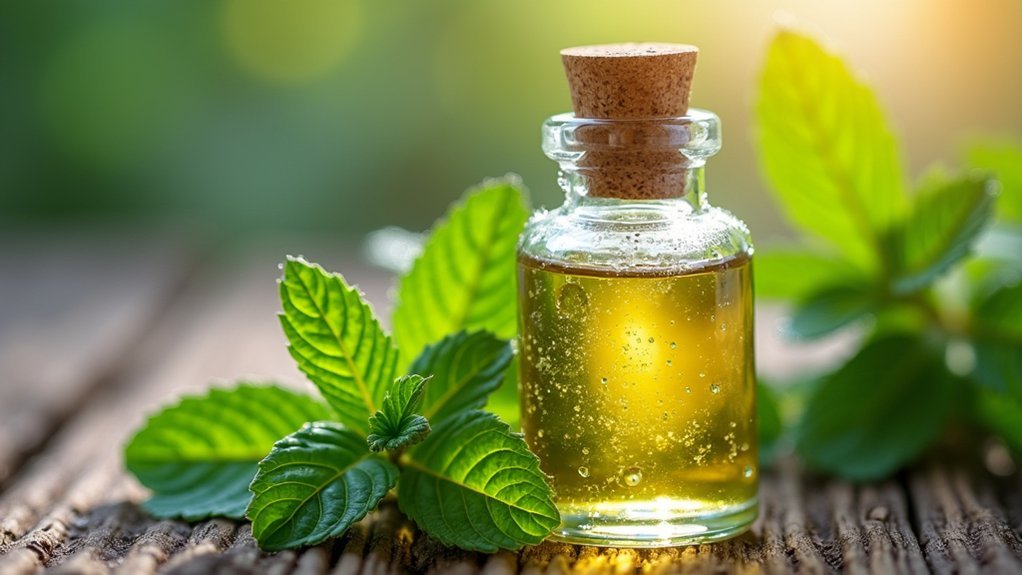Peppermint oil repels mice effectively because it contains menthol that irritates their sensitive nasal cavities. The strong scent disrupts their ability to detect food and communicate through pheromones, fundamentally blocking their navigation system. You’ll need to apply it consistently at entry points, baseboards, and other mouse pathways using cotton balls or spray solutions. For best results, reapply every few days and combine with other natural deterrents. The following strategies will transform your mouse problem into a thing of the past.
The Science Behind Peppermint Oil’s Rodent-Repelling Properties

While many homeowners turn to harsh chemicals to combat mouse infestations, peppermint oil offers a natural alternative that works through biological mechanisms. The secret lies in how this potent oil affects mice physically and behaviorally.
Peppermint oil contains menthol, which irritates mice’s nasal cavities, creating an uncomfortable environment they’ll avoid. You’ll find it effective because mice rely heavily on their sense of smell – the strong scent disrupts their ability to detect food sources and communicate through pheromones.
When you use peppermint oil as a natural deterrent, you’re fundamentally blocking their navigation system. The overwhelming aroma masks the pheromones mice use for communication, causing confusion and driving them away.
For best results, apply high doses regularly to repel mice effectively without endangering your family or pets.
How to Create and Apply Peppermint Oil Sprays for Maximum Effect
To create an effective peppermint oil repellent, you’ll need to mix two teaspoons of 100% peppermint oil with one cup of water and a few drops of dish detergent for proper dispersion.
Apply your spray strategically around entry points, baseboards, and window frames where mice are likely to travel or enter your home.
You should reapply every few days to maintain the strong scent barrier, as the repelling effect weakens over time when the aroma fades.
Mixing Ratios Matter
Creating the perfect peppermint oil spray requires precise measurements for maximum effectiveness against mice. The ideal formula combines two teaspoons of 100% peppermint oil with one cup of water in a spray canister. This ratio delivers the strong scent that mice find overwhelming without wasting product.
For enhanced performance, add 3-5 drops of dish detergent to help the peppermint oil disperse evenly throughout the water and stick to surfaces longer. This simple addition greatly improves the spray’s ability to deter mice.
Remember to reapply your peppermint oil spray every few days, as the scent diminishes over time. For thorough protection, spray entry points, baseboards, and corners where mice travel.
Supplement with peppermint-soaked cotton balls in hard-to-reach areas for maximum coverage.
Strategic Application Points
Effective placement of peppermint oil determines its success in repelling mice from your home. Focus your spray application on areas where you’ve spotted mouse activity, particularly entry points like doors, windows, and baseboards. These locations create a natural barrier that mice won’t want to cross.
For enhanced mouse control, strategically place cotton balls dabbed with peppermint essential oil in cabinets, crawl spaces, and other hidden areas mice frequent. This two-pronged approach creates both barriers and targeted deterrents throughout your home.
Remember that consistency is vital – you’ll need to reapply your peppermint oil solution every few days or after cleaning surfaces.
Monitor these strategic application points regularly for signs of continued mouse activity, adjusting your placement as needed for best results.
Strategic Placement: Where to Position Peppermint Oil in Your Home

When battling a mouse infestation, strategic placement of peppermint oil can greatly enhance its effectiveness as a natural deterrent. You’ll want to position cotton balls soaked in peppermint oil precisely where mice travel most frequently. Keep mice away by targeting corners, cabinets, and entry points they commonly use.
| Location | Application Method | Reapplication Frequency |
|---|---|---|
| Entry points | Cotton balls | Every 3-5 days |
| Baseboards | Spray solution | Weekly |
| Cabinets | Cotton balls | Twice weekly |
| Windows/doors | Spray solution | Weekly |
| Mouse pathways | Both methods | Every 3 days |
Using peppermint oil alongside traditional mouse traps creates a thorough approach. Remember to seal gaps before applying the oil, as strategic placement won’t compensate for accessible entry points that mice can easily breach.
Combining Peppermint Oil With Other Natural Deterrents for Better Results
Though peppermint oil works as a standalone mouse deterrent, you’ll achieve markedly better results by combining it with other natural repellents.
When you mix peppermint oil with eucalyptus or lavender oil, you create a powerful scent combination that mice find overwhelming and confusing.
For enhanced effectiveness, try creating a spray mixture of peppermint oil and vinegar—the acidity complements the minty aroma to repel mice more efficiently.
You can also boost your pest control strategy by using peppermint oil alongside physical barriers like steel wool at entry points.
Consider sprinkling diatomaceous earth around treated areas for long-term prevention, or add crushed red pepper to your peppermint oil solution for an extra layer of deterrence.
These combinations create extensive control methods that tackle rodent problems from multiple angles.
Common Mistakes to Avoid When Using Peppermint Oil Against Mice

When using peppermint oil as a mouse deterrent, you’ll sabotage your efforts if you don’t replace the oil regularly as its potency fades within days.
You might waste your time and money by applying diluted solutions that mice barely notice instead of using concentrated formulations.
Placing the oil in incorrect locations—such as areas mice don’t frequently travel—rather than along walls, entry points, and known pathways will greatly reduce its effectiveness.
Not Replacing Regularly Enough
One critical mistake many homeowners make with peppermint oil is underestimating how quickly it loses potency. The smell of peppermint oil fades within days, rendering your pest control strategy ineffective against mice with their strong sense of smell.
To maintain an effective barrier against mice activity:
- Replace peppermint oil-soaked cotton balls weekly, not monthly, as their repellent properties diminish rapidly.
- Reapply spray treatments every 3-5 days, especially in high-traffic areas where mice have been spotted.
- Check the freshness of your peppermint oil supply—old bottles won’t deliver the potent menthol scent needed.
- Implement a consistent schedule for regularly replacing all treatments, marking it on your calendar to guarantee you don’t forget.
Wrong Application Areas
Even with a consistent replacement schedule, your peppermint oil strategy can fall flat if you’re targeting the wrong spots. Mice typically avoid open areas, so applying peppermint oil effectively requires focusing on entry points and common hiding spots where rodents actually travel.
| Location | Effectiveness | Why |
|---|---|---|
| Entry points | High | Deters mice before they enter |
| Hiding spots | High | Disrupts nesting areas |
| Open spaces | Low | Rarely visited by mice |
Simply dabbing oil in random locations won’t solve your problem. Remember that dust and debris can reduce effectiveness, so prioritize clean areas for application. Don’t make the mistake of relying solely on peppermint oil—combine it with other deterrents like sealing gaps and setting traps to prevent ongoing infestations. Regular reapplication in strategic locations is your best approach.
Too Diluted Solutions
The most critical error homeowners make with peppermint oil is creating solutions that lack potency. When your mixture is too weak, mice won’t be deterred by the barely-there aroma that should be overwhelming their sensitive noses.
For truly effective results when using peppermint oil to repel mice:
- Maintain at least 10% concentration in your solutions – anything less considerably reduces effectiveness
- Use at least 2 teaspoons of pure peppermint oil per cup of water to guarantee a strong scent that irritates mice
- Add a few drops of dish detergent as a surfactant to prevent oil separation and maintain effectiveness
- Check the freshness of your peppermint oil – old or poorly stored oil loses its potent aroma
Remember that diluted solutions require more frequent reapplication to maintain the strong scent needed to keep mice away.
Real-Life Success Stories: Evidence of Peppermint Oil’s Effectiveness
While scientific studies provide valuable data, firsthand accounts from homeowners offer compelling evidence of peppermint oil’s effectiveness against mice. One homeowner reported that after applying peppermint oil spray and sealing a wall hole, mouse activity completely stopped in their home. The strong smell irritates mice’s nasal passages, making your home less inviting to these unwanted guests.
Many users have discovered that strategic placement of peppermint-soaked cotton balls near entry points greatly reduced mouse sightings within days. Regular application maintains this deterrent effect, with some experiencing immediate results upon first use.
While a pest control professional might offer chemical solutions, these real-world successes suggest peppermint oil can be an effective natural alternative when used correctly and consistently as part of a thorough approach to mouse prevention.
Frequently Asked Questions
Does Peppermint Oil Really Keep Mice Away?
Yes, peppermint oil can keep mice away. Its strong menthol aroma overwhelms their senses, disrupts their communication, and masks navigation pheromones. You’ll need regular reapplications for effectiveness, but results aren’t guaranteed for all infestations.
How Long Does It Take Peppermint Oil to Get Rid of Mice?
You’ll notice peppermint oil’s deterrent effects from day one, but don’t expect instant elimination. You’ll need regular reapplications as the scent fades, and you should seal entry points for best results within weeks.
What Do You Mix Peppermint Oil With to Make a Spray?
Mix two teaspoons of peppermint oil with one cup of water in a spray bottle. Add 3-5 drops of dish detergent to help the oil disperse better. Shake well before each use.
What Is the Most Effective Mouse Repellent?
Commercial ultrasonic repellers, peppermint oil, and predator urine are most effective. You’ll get best results by combining repellents with proper sealing of entry points and maintaining clean, food-free environments in your home.
In Summary
You’ve now learned why peppermint oil works against mice and how to use it effectively in your home. By understanding its natural repelling properties and applying it correctly, you’ll create an environment mice simply can’t stand. Remember to refresh your applications regularly and combine with other deterrents for best results. With consistent use, you’ll enjoy a mouse-free home naturally.





Leave a Reply